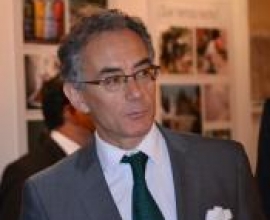"The fact that FIIAPP is one of the leading actors in EUROsociAL for these themes is a guarantee of success"
03/12/2013
PrintManuel Lejarreta, Spanish Ambassador to Guatemala
What is Spanish cooperation working on through its different institutions in Guatemala?
In Guatemala we've done work in basically three sectors. The first is governance, security and justice, by supporting the Public Prosecutor's Office, the Attorney General's Office, the judicial system, in strengthening this system and particularly with a very specific gender focus, in the theme of gender violence and empowerment of women. The second sector where we worked in Guatemala was the social development sector, including rural development, on everything related to basic services: health and education, for example with a focus on training small farmers in small towns on how to leverage the potential for tourism so that they can take advantage of this possible source of income. And the third sector was the cultural heritage programme and school-workshops. Very important work was done in recovering historic places, such as the Antigua Training Centre, and also in urban design, such as the redesign of Seventh Avenue in Guatemala City, the capital, which has gone from being a marginal space to a convivial one.
But a few years ago, in relative terms, Spanish cooperation faced a new challenge with an even greater impact on the country.
To the above, a fourth, newer, resource was added, which is the Spanish Cooperation Fund for Water and Sanitation, which for Guatemala has 100 million dollars in funding. This will be executed through one of two channels. Either directly with the commonwealths, or through the IDB (Inter-American Development Bank). Spain places this money in the IDB and this institution executes it with the INFOM (Institute for Municipal Development). Now, this cooperation is not new because we've already done a lot of work on water and sanitation issues, but this will now be strengthened with the influx of these 100 million dollars.
Starting now?
Last June a CPF (Country Partnership Framework) was signed. This is an official document that will govern cooperation for the next four years, and in it we've concentrated on two sectors. On the one hand, combating malnutrition in the country, aligning ourselves with the policies of the government. And on the other, in the security and justice theme, with a very radical approach in the issue of trying to reduce rates of violence against women and, in particular, to reduce femicide rates. These are the two main blocks where Spanish Cooperation will be working in coming years, in addition to the Cooperation Fund for Water and Sanitation, which remains in effect.
Spain and the European Union also are present in Guatemala through the EUROsociAL Programme, led by the FIIAPP, in various key sectors for social cohesion: social dialogue, social protection, justice, public finance, and regional development.
FIIAPP is a very prestigious institution and already very well known. And I believe that the fact that FIIAPP is one of the leading actors in EUROsociAL for these themes is a guarantee of success. And the cooperation being done by the European Union here, which is also Spanish cooperation because the EU is all of us, is very compatible with what we're doing. They are working on the same themes more or less, and there is good coordination. There is a possibility that in the near future the European Union, which has considerable funds, will take advantage of our expertise through delegated cooperation. This way we would add our people and our technical knowledge and experience in the country to the EU resources, which are very abundant for the next six years.
FIIAPP

